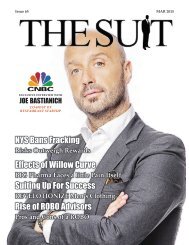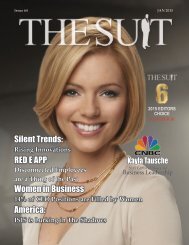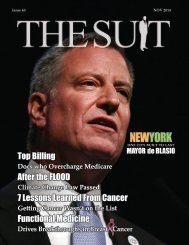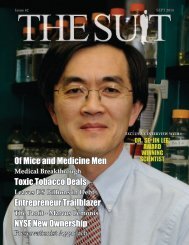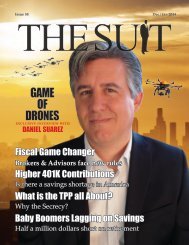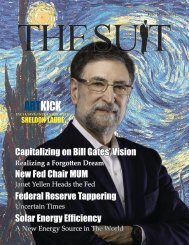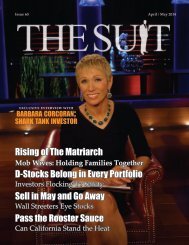o_19grqq7snim9mn019q11f7ds26a.pdf
Marcus Lemonis, a serial entrepreneur and host of the show “The Profit” on CNBC, is a true survivor in the corporate world. The native-born Lebanese business man endured the chaos of a civil war in Beirut and eventually moved to Miami. Lemonis was exposed to the automotive industry throughout his upbringing - his grandfather owning two of the largest Chevrolet dealerships in the United States and Lee Iacocca serving as the family friend and later mentor to Lemonis. On page 12, we conducted an interview with “Profit” host Marcus Lemonis, who offers struggling small businesses capital investment and his expertise in exchange for an ownership stake in the company. In the latter part of the magazine, we interviewed countless wealth advisors during these tough economic times. We recognize that some of the changes in 2013 and 2014 require relevance for financial planners. Therefore, the financial industry continues to push for more realistic standards and reforms.
Marcus Lemonis, a serial entrepreneur and host of the show “The Profit” on CNBC, is a true survivor in the corporate world. The native-born Lebanese business man endured the chaos of a civil war in Beirut and eventually moved to Miami. Lemonis was exposed to the automotive industry throughout his upbringing - his grandfather owning two of the largest Chevrolet dealerships in the United States and Lee Iacocca serving as the family friend and later mentor to Lemonis. On page 12, we conducted an interview with “Profit” host Marcus Lemonis, who offers struggling small businesses capital investment and his expertise in exchange for an ownership stake in the company. In the latter part of the magazine, we interviewed countless wealth advisors during these tough economic times. We recognize that some of the changes in 2013 and 2014 require relevance for financial planners. Therefore, the financial industry continues to push for more realistic standards and reforms.
Create successful ePaper yourself
Turn your PDF publications into a flip-book with our unique Google optimized e-Paper software.
want people to know that it’s ok to be<br />
insecure, that it’s ok to be scared, that<br />
it’s ok to be depressed once in a while,<br />
it’s ok to feel sorry for yourself. But it<br />
doesn’t change the fact that you still<br />
have to do your thing.”<br />
Lemonis continued on. “Society has<br />
created this veil that you have to be superman<br />
and superwoman. The number<br />
one thing that the show has done<br />
for me is it has freed me of having to<br />
worry about what people think about<br />
me. It’s freed me from having to do<br />
something or say something different<br />
than what I really feel.”<br />
Being a problem solver is a requirement<br />
if you want to be an effective<br />
leader according to Lemonis, and “The<br />
Profit” is all about problem-solving.<br />
“You have to be empathetic and sympathetic<br />
to people, and you have to be<br />
humble enough to think it’s important<br />
to do that,” Lemonis said. He tries<br />
to understand the history of a situation,<br />
people’s perspectives—and their<br />
pride. “You also have to be willing to<br />
put yourself out there and be vulnerable.<br />
Too often, people try and create<br />
this persona that’s larger than life<br />
without any frailties. I have found that<br />
the more vulnerable I can make myself<br />
to people, the more open and critical I<br />
can be of myself, then the easier it is for<br />
people to take criticism of their style,<br />
or product, or whatever it may be.”<br />
It was through Lemonis’ own struggles<br />
that he evolved into his leadership<br />
style of today, and he reflects back to a<br />
time that was difficult, if not financially<br />
devastating for him and for millions of<br />
Americans.<br />
“Two-thousand eight and 2009 were<br />
the hardest thing that ever happened<br />
to me,” admitted Lemonis referring to<br />
the epic fail of the U.S. economy. “It<br />
takes something very cataclysmic to<br />
bring you back to earth.”<br />
Just a few years prior, Lemonis was<br />
caught up in what he now considers<br />
to be lavish spending—not all that uncommon<br />
for a single man in his thirties<br />
experiencing sizable wealth through<br />
his own accomplishments.<br />
“As quick as you can make it, is as<br />
quick as you can lose it.” Lemonis said<br />
as a personal testimony. “So I have a<br />
different perspective today, and I also<br />
learned about myself. I learned about<br />
what my priorities should be and how<br />
to focus on the right stuff, and not to let<br />
my thinking get out of whack.”<br />
So how does Lemonis bring the<br />
fruits of his own experience to aid and<br />
assist—better yet, save other businesses?<br />
Here’s how.<br />
“When I meet with these small businesses<br />
that are on death’s doorstep…I<br />
tell them three things,” Lemonis explained:<br />
‘One: You’re on death’s doorstep.<br />
Two: You are about to get life-saving<br />
surgery, but I can’t give you any anesthesia,<br />
so it’s gonna really hurt.<br />
Three: It’s a painful process. But<br />
if you trust me through this you will<br />
come out on the other side a lot better.’”<br />
Marcus Lemonis said he performed<br />
“self-surgery” on himself in 2008-09.<br />
“I learned a skill…that gives me the<br />
ability today to look somebody in the<br />
face and say, ‘You have no choice but<br />
to change.’”<br />
THE SUIT MAGAZINE p.15




